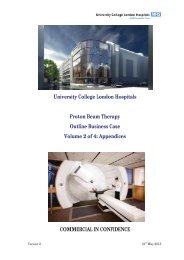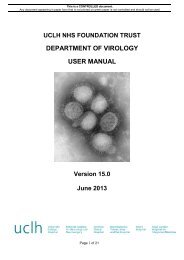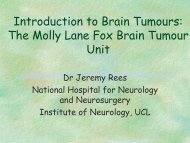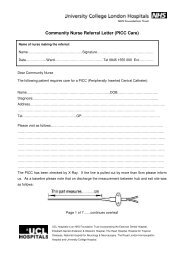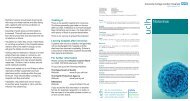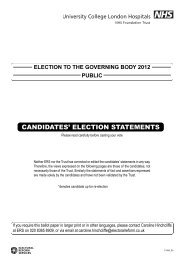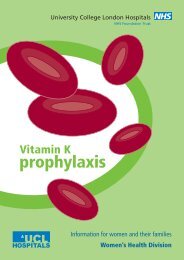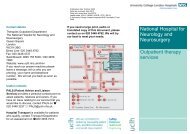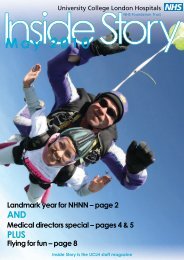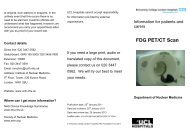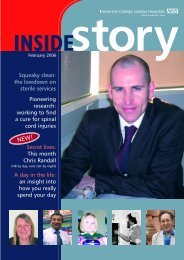How patients have helped us with our research - University College ...
How patients have helped us with our research - University College ...
How patients have helped us with our research - University College ...
You also want an ePaper? Increase the reach of your titles
YUMPU automatically turns print PDFs into web optimized ePapers that Google loves.
16 14 UCLH BIOMEDICAL RESEARCH UNIT<br />
Patients advise on best way of doing<br />
prostate <strong>research</strong><br />
Patients <strong>have</strong> been playing<br />
a major part in helping<br />
<strong>research</strong>ers develop new ways<br />
of diagnosing and treating<br />
prostate cancer.<br />
Researchers at UCLH/UCL <strong>have</strong><br />
developed promising new ways<br />
of diagnosing prostate cancer<br />
more accurately and of <strong>us</strong>ing<br />
less invasive treatments. But it<br />
has taken essential input from<br />
<strong>patients</strong> to bring these new<br />
options closer to becoming a<br />
reality.<br />
Why new ways of<br />
diagnosing prostate cancer<br />
are needed<br />
The blood test for Prostate<br />
Specific Antigen (PSA) which<br />
is normally <strong>us</strong>ed can be<br />
misleading. Raised PSA levels<br />
may be a sign of cancer<br />
but may also be ca<strong>us</strong>ed by<br />
other factors like infection or<br />
inflammation. The test cannot<br />
distinguish between aggressive<br />
cancers needing radical<br />
treatment and slow growing<br />
tum<strong>our</strong>s that need monitoring<br />
only.<br />
The current biopsy test is also<br />
not accurate. The test involves<br />
taking 10-12 tissue samples<br />
from the prostate via the<br />
rectum. But trying to pin point<br />
cancer like this is very hit and<br />
miss – a bit like trying to hit the<br />
pip in an orange <strong>us</strong>ing a needle.<br />
One of the key ways <strong>patients</strong><br />
<strong>helped</strong> was by enc<strong>our</strong>aging<br />
<strong>research</strong>ers to be clear and<br />
honest about the processes<br />
involved in their <strong>research</strong><br />
and about the purpose of<br />
treatments. This has meant<br />
<strong>research</strong>ers <strong>have</strong> been able to<br />
enlist men to participate in their<br />
study. Researchers <strong>have</strong> also<br />
been able to understand better<br />
which treatments <strong>patients</strong><br />
prefer and why.<br />
Until recently men at risk of<br />
prostate cancer <strong>have</strong> undergone<br />
tests such as blood tests and<br />
biopsies that are deeply flawed.<br />
So a team of <strong>research</strong>ers at<br />
UCLH led by Professor Mark<br />
Emberton decided to see<br />
whether MRI imaging or<br />
scanning could be <strong>us</strong>ed to<br />
diagnose prostate cancer more<br />
accurately.<br />
© UCLH Photography Department<br />
Professor Mark Emberton leads the team <strong>research</strong>ing<br />
the <strong>us</strong>e of scanning to diagnose prostate cancer



